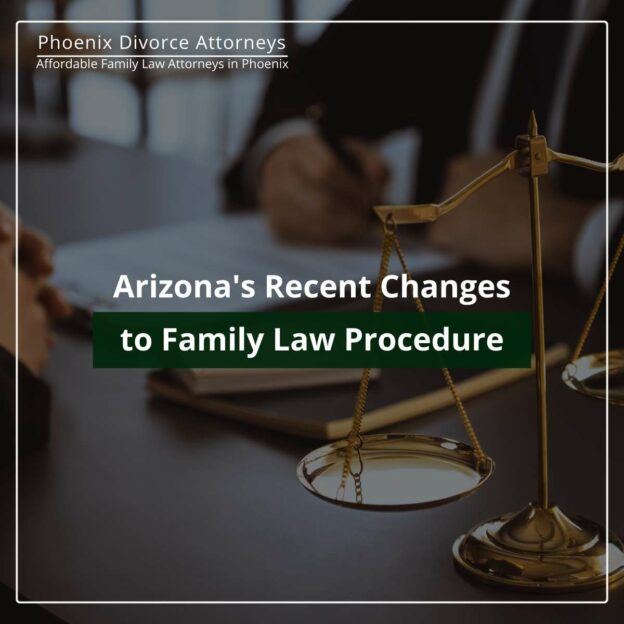As with all other types of law, the field of family law is constantly changing and expanding. Arizona’s state legislature makes frequent changes to the family law rules of procedure, or the laws regarding how matters should be conducted in a family law setting. On August 22, 2023, the Arizona Supreme Court held a Rules Agenda in which several changes were made to the state rules of family law procedure. There will be another Rules Agenda held on December 5, 2023, to confirm these changes to the rules and make them permanent. These rules could have little to no effect on how you conduct your family law case, or they could be relevant enough to provide some benefit or disadvantage. You can find some of the changes that were made to Arizona family law below. If you need additional information about how they could affect your case, or if you are seeking an experienced family law attorney to take on your case, call 602-609-7000 for your free phone consultation with our firm.
Rule 84: Motion for Clarification
This rule was amended to add a 6-month time limit for a litigant to petition the court for a motion for clarification. A motion for clarification under Rule 84 can be issued to explain the court’s decision if it is confusing or susceptible to more than one reasonable interpretation. Previously, there was no time limit to file such a motion in an Arizona family law case. The nonmoving party should be provided with an opportunity to respond to the motion for clarification. The court can’t reopen a case or hear additional evidence through a motion for clarification petition.
New Rule 81: Post-Judgment Parenting Time Supervision & Case Implementation Supervision
Rule 81 states that parenting time orders must be consistent with the child’s best interests. If the court finds that “without a continuation order the child’s physical health would be endangered or the child’s emotional development would be significantly impaired, the court may order parenting time or case implementation supervision consistent with the child’s best interests.” Parenting time supervision is also known as supervised visitation, or when a third party is physically present during parenting time to make sure the child isn’t endangered. This might be ordered if the defendant has been convicted of dangerous crimes or has a history of substance abuse. Case implementation supervision is when a third party monitors to make sure the parents are abiding by the terms of their custody orders. This might occur if either parent has committed custodial interference or parental alienation. The parents can agree upon a supervisor from a list provided by the court, or the judge can select the supervisor. The appointment order should indicate who will be responsible for the supervisor’s fees.
Rule 48: Emergency Temporary Orders (Without Notice)
This rule specifies that a party may request emergency temporary orders in a family law case at the same time as filing a pre-decree or post-decree petition. Under Rule 48, the court should only hold an accelerated hearing on emergency temporary orders if the party’s petition sets forth the specific relief requested and the specific facts that support that relief, and if it provides specific facts that establish why an emergency or accelerated hearing is required. The petition can be granted without notice if the motion clearly shows by specific facts that if an order is not issued before the adverse party can be heard, the moving party or a minor child of the party will be irreparably injured, or irreparable injury, loss or damage will result to the separate or community property of the moving party. The court must hold a hearing on the temporary orders no less than 10 days after they are issued.
Rules 44.1(e), 45(c), 78(g), 91.3, & 97: Education Orders
This new rule requires Arizona parents addressing physical and/or legal custody issues to submit an education order when entering a final judgment. An education order clarifies many issues that are relevant to a minor child’s schooling. The parents should provide their child’s school with a copy of the education order for their purposes, but the order is only binding on the parents. The education order should inform the school which types of legal decision-making rights each parent has. The education order should inform the school which types of legal decision-making rights each parent has under Rules 44.1(e), 45(c), 78(g), 91.3, and 97. It should also include a schedule of when each parent should pick up the child, but the school shouldn’t limit parental contact unless otherwise ordered. If applicable, the parents should include a list of individuals who are authorized to pick the child up from school. The order should indicate whether both parents have access to school grounds and activities in compliance with school policies. It also needs to indicate if both parents should be able to access the child’s school records and parent portal, as well as attend parent-teacher conferences.
Rule 34: Continuances & Scheduling Conflicts
A party who is requesting a continuation of a trial, hearing, or conference on a basis of good cause other than unavailability and scheduling conflict under Rule 34, must show five things:
- The basis for the good cause for a continuance;
- When the party learned of the circumstance(s) which form(s) the basis for the good cause and why the motion was not or could not have been brought at an earlier date;
- The party’s diligence and efforts in attempting to avoid the circumstance(s) which form(s) the good cause for the continuance;
- The prejudice which may be caused to either party or any children at issue in the action by granting the continuance and by denying the continuance;
- The continuance is sought in good faith and not for delay or another improper purpose.
Rule 44.1: Default Decree or Judgment by Motion & Without a Hearing
The changes to Rule 44.1 indicate that a spouse seeking spousal maintenance should use the spousal maintenance calculator provided by the court. However, a calculation obtained using the court guidelines can’t be used as evidence that the spouse is entitled to spousal maintenance under Rule 44.1. If the parties agree to spousal support, they must include a proposed spousal maintenance order supported by a Spousal Maintenance Guidelines worksheet. This worksheet is generated by filling in information from the spousal maintenance calculator. If the parties deviate from this amount, they should state the basis for doing so.
Trust Your Arizona Family Law Case to the Professionals
Family law is already complicated enough before factoring in rules of procedure that are changed and updated each year. Your case could even last long enough that changes to family law procedure could take effect before your orders are finalized. Without extensive experience and knowledge in Arizona family law, these issues can be highly difficult to navigate. At Phoenix Divorce Attorneys, we make these issues approachable and understandable while eliminating most of the legwork for their clients. A quality family law attorney is even more crucial in high-conflict cases where the parties have vastly different desired resolutions. Overturning finalized family law orders is an uphill battle that will be costly from a financial and emotional standpoint. Don’t leave any factors up to chance- hire a family law attorney who makes you feel secure and confident about the process. To schedule your free consultation by phone with one of our experienced Arizona family lawyers, call 602-609-7000.
My AZ Lawyers
Office: (480) 833-8000
Phoenix Family Law Office
668 N. 44th St., Ste 320
Phoenix, AZ 85008
Scottsdale Family Law Office
7135 E. Camelback Rd, Ste 230
Scottsdale, AZ 85251
Avondale Family Law Office
12725 W. Indian School Rd, Ste E-101
Avondale, AZ 85392
Mesa Family Law Office
1731 W. Baseline Rd., Ste 100
Mesa, AZ 85202
Glendale Family Law Office
20325 N. 51st Ave., Ste 134
Glendale, AZ 85308


